Most thyroid cysts are completely benign and nothing to worry or stress over.
But some cysts may contain cancerous cells that require more aggressive treatment.
This guide will teach you everything you need to know about thyroid cysts including symptoms, management, and how to determine if your cyst is cancerous or not.
What is a Thyroid Cyst?
It’s helpful to think of a thyroid cyst as a subtype of a thyroid nodule.
A thyroid nodule is simply a growth on your thyroid gland that is found in your neck.
Thyroid cysts are a type of thyroid nodule that is entirely filled with “fluid”.
These cysts can range in size from very small to very large.
They also vary in how they look on ultrasound.
Cysts which are large and entirely filled with fluid are almost always benign (nothing to worry about).
Some cysts, referred to as complex cysts, contain a combination of solids and fluid inside the nodule itself and these have a higher risk of being cancerous (1).
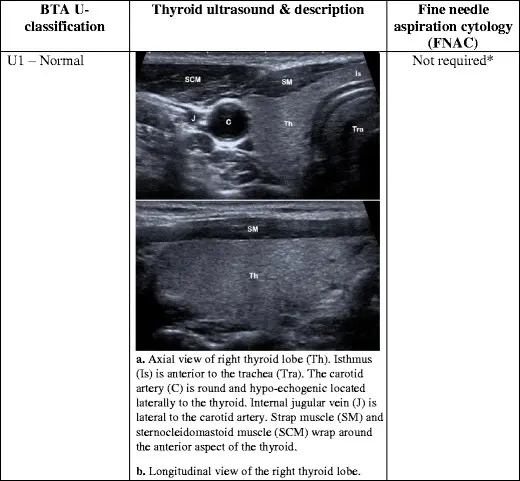
You will most likely not know you have a thyroid cyst unless you have a thyroid ultrasound.
The reason for this is that thyroid cysts feel just like solid thyroid nodules during the examination and it’s only during thyroid ultrasound that they can be differentiated.
The biggest concern that most people have when it comes to thyroid cysts is whether or not they are cancerous or dangerous.
Most of the time they are nothing to worry about but we will discuss some of the treatment options below.
Do Cysts Cause Symptoms?
Most thyroid cysts do NOT cause any symptoms at all (2).
In fact, they are almost always picked up by routine exams and most patients are surprised to know that they have a nodule or cyst on their thyroid.
Some thyroid cysts may cause symptoms if they are too large or if they grow too quickly.
These types of cysts may cause issues with swallowing or pain in the neck because of their size.
If your cyst is cancerous it may also cause issues such as enlargement of the lymph nodes in your neck area (but remember this is not common).
Below you can find a list of symptoms that may be associated with thyroid cysts:
- Most cysts and nodules are asymptomatic (meaning they are not associated with any symptoms).
- Some cysts may be large enough to cause pain when swallowing or a sensation that something is in your throat.
- If a cyst is cancerous it may also cause an enlargement of lymph nodes in your neck area which can be firm.
- Other large cysts may cause pain, changes to your voice (usually hoarseness), difficulty when breathing, and pain in the thyroid gland (but these are less common).
For the most part, you will probably not have any symptoms if you have a thyroid cyst.
How Are They Treated?
Treating thyroid cysts largely depends on a few very important factors:
Is the thyroid cyst “simple” (3) on ultrasound imaging? (small cysts less than 3cm in size can usually be monitored)
Is the thyroid cyst “complex” (4) on ultrasound imaging? (Complex cysts usually require a biopsy or needle aspiration to rule out cancer)
Is the thyroid cyst small or large? (5) (Small cysts usually do not cause any symptoms but large cysts may require treatment to help alleviate symptoms)
Does the cyst appear solid or completely fluid-filled? (The more solid your cyst is the more likely it is to have cancerous cells and thus may require a biopsy or aspiration)
The answers to these questions will help determine how aggressive you should be in treating your cyst.
The more benign your cyst looks the more conservative you can be.
If your cyst is large, causing symptoms or suspicious for cancer then you may need to be more aggressive.
You can find a list of treatments below from most conservative to least conservative:
#1. Careful Monitoring
If your cyst is simple, small, and does not have any features that may increase the risk of thyroid cancer then your doctor may simply recommend the “wait and see” approach.
This approach is very common because up to 15% of simple thyroid cysts may completely resolve on their own and most cysts do not grow or become larger over time.
Other small and simple cysts just need to be monitored and checked out with semi-frequent ultrasound tests (every 6-12 months) to ensure that they are not getting bigger.
In many cases, it may cause more harm than good to stick a needle into your thyroid or to try and remove it via surgery as opposed to simply monitoring it over time.
#2. Fine Needle Aspiration
Sometimes, large cysts may need to be drained with a procedure known as fine needle aspiration.
This is a small procedure in which a needle is placed through the skin (guided by ultrasound) into your cyst where a syringed is used to “suck out” the fluid inside.
This procedure is usually very quick and not as painful as it sounds.
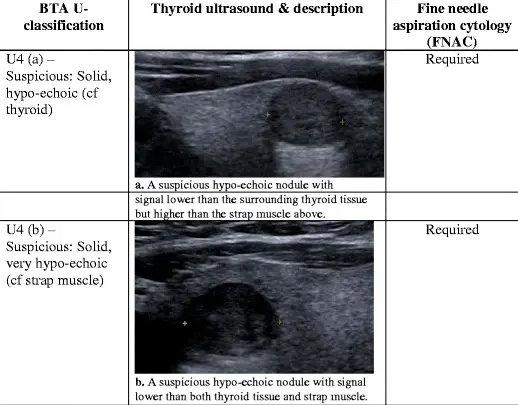
Typically fine needle aspiration is used if your cyst is either very large or if your Doctor wants to ensure that the cyst does not contain cancerous cells.
The main reason that this procedure is not used on all cysts is that even after the fluid inside a cyst is removed, up to 85% of the time the fluid will come back rendering the procedure ineffective.
But, if you need to know if your cyst is cancerous (or if the cyst is very large) then this procedure may be necessary.
#3. Ablation
If aspiration of the cyst does not work then your doctor may recommend an ablative procedure with something like ethanol.
During this procedure, a small amount of a caustic agent is inserted into your cyst with the hopes that it destroys the fluid-producing cells.
#4. Thyroid Surgery
As a last resort, your doctor may recommend thyroid surgery or complete removal of the cyst (7).
This is not typically used to treat thyroid cysts unless they are very large, causing severe symptoms or if other less invasive procedures have failed.
Thyroid Cysts & Thyroid Function
One of the concerns that many people have is thyroid function.
Your thyroid controls many very important functions in your body ranging from your body temperature to your metabolism and even your heart rate.
These functions are regulated by thyroid hormone which is produced by the thyroid gland.
Because of this, it’s natural to think that problems with the thyroid gland itself may cause problems in the production of thyroid hormone.

Luckily, when it comes to thyroid nodules and thyroid cysts this is rarely the case.
Most thyroid cysts do NOT cause any problem with your thyroid gland or its ability to function and create thyroid hormone (8).
In some rare cases, if your cyst/nodule is large enough or if it is cancerous it may cause local damage to thyroid gland tissue but this is very uncommon.
If you have a thyroid cyst and you are experiencing symptoms such as fatigue, weight gain, cold skin, constipation or other symptoms of hypothyroidism, then you can easily check your thyroid function with some simple and routine thyroid blood tests.
These tests will help determine if your thyroid is functioning normally.
Can Thyroid Cysts be Cancerous?
The main concern, from your perspective and from your Doctors, is whether or not your thyroid cyst is cancerous.
This is the most important question that both of you should have.
Because if there is any suspicion that your cyst is cancerous then it completely changes how you look at the nodule and how you should approach treatment.
The main goal when determining how to treat or what therapies you should use comes down to how likely you think that your cyst is cancerous.
But are most cysts cancerous?
It turns out, that much like thyroid nodules, most thyroid cysts are NOT cancerous.
But because you never want to miss the diagnosis of cancer, your Doctor will probably at least order an ultrasound to evaluate your cyst just to make sure.
Because cancers alter how your cells normally function, it is possible that cancer cells may be more likely to produce fluid when compared to normal thyroid cells.
These changes to your cells, if cancer is present, can sometimes be identified early based on how they look under ultrasound imaging.
Features such as how large your cyst is, if it is completely fluid-filled or partially fluid-filled, if it has blood flow in it, and so on may help predict how likely your cyst is to be cancerous (9).
The more abnormal results that are seen on ultrasound the more likely your cyst may be cancerous and the more aggressive your Doctor will be with treatment.
Up to 5% of all fine needle aspirations contain cancerous cells (10) but this percentage varies based on your age (the older you are the more likely your cyst is to be cancerous).
Your Next Steps
What should you do if you suspect you have a thyroid nodule or a thyroid cyst?
You can follow the steps below to ensure that you are getting the proper care:
- Go get a complete history and physical exam from your doctor. This may include feeling your thyroid gland to ensure it is not abnormal.
- If necessary you may need an ultrasound to help identify any abnormal features of your cyst. An ultrasound will help you know the size of your cyst and if it is considered a simple cyst or a complex cyst.
- Check your thyroid function if you are experiencing symptoms such as fatigue, weight gain, or depression. Tests such as the TSH, free T3, and free T4 can help determine if your thyroid is functioning normally.
- If necessary obtain a fine needle aspiration of your cyst to determine if there are any cancerous cells inside.
- Determine how to proceed with treatment. Do you need to watch or monitor your cyst with frequent ultrasounds or do you need to try and remove the fluid inside?
- Periodically check on your thyroid gland with doctors’ visits and feeling of your neck/thyroid gland over time.
Conclusion
Thyroid cysts are not as common as solid thyroid nodules but they are still important to understand.
It’s helpful to think of thyroid cysts as a subtype of thyroid nodules but one that is usually completely filled with fluid.
The majority of cysts are benign and not dangerous.
Some cysts, if they have abnormal features, may be cancerous and may require more aggressive treatment.
Treatment ranges from watchful waiting and monitoring to complete removal.
If there is any doubt that your cyst contains cancer then your doctor will check for cancerous cells with a fine needle aspiration.
And while thyroid cysts are not always responsive to natural treatments like supplements, it’s often a good idea to try them if you have the resources available.
Because the worst case scenario is that they do nothing, but, on the other hand, they may actually help shrink your cyst.
Now I want to hear from you:
Do you have a thyroid cyst?
Are you experiencing any symptoms?
What treatment have you undergone?
Leave your comments below!
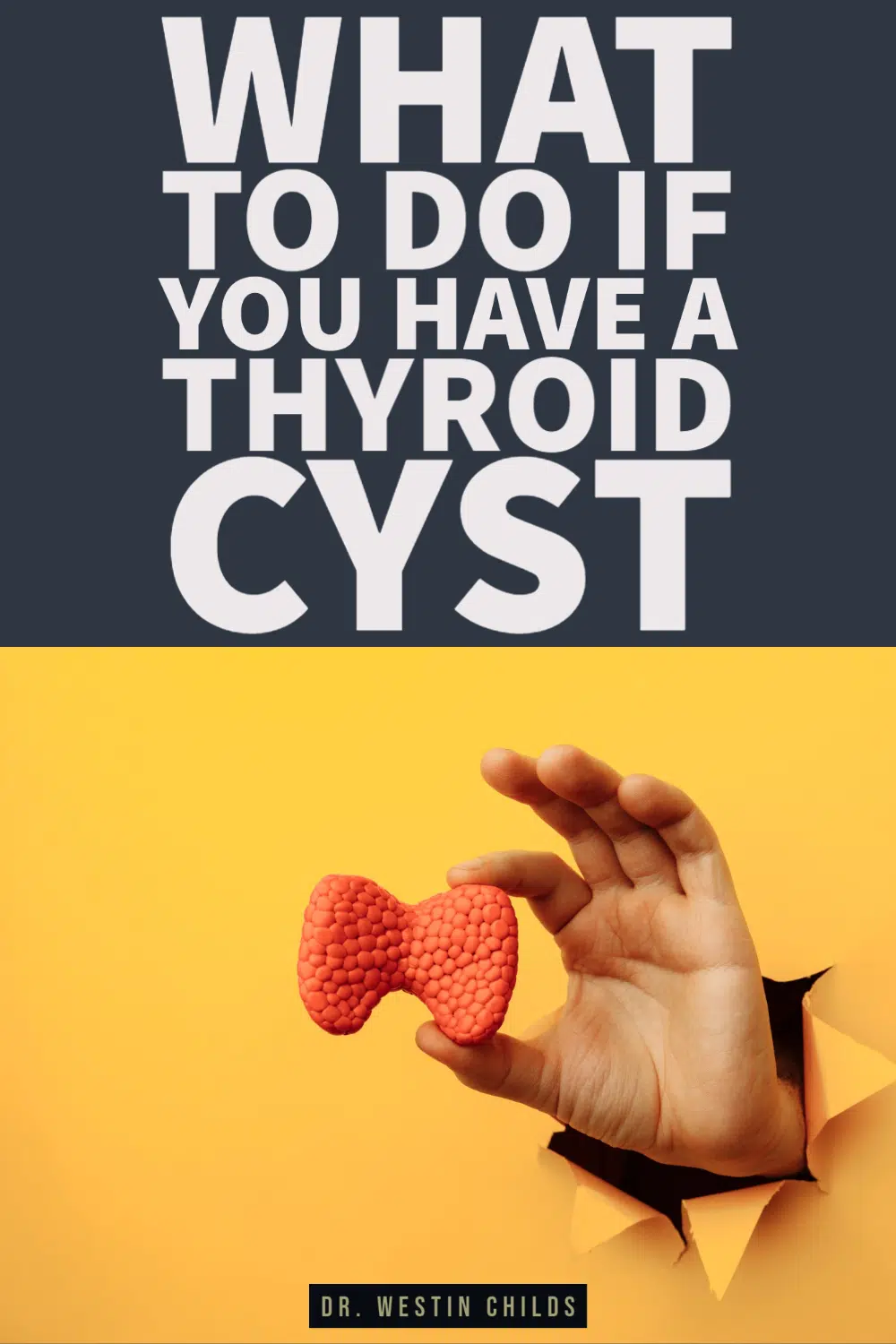
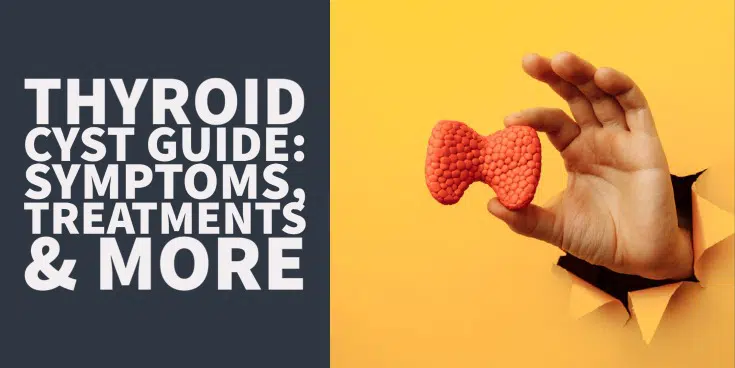
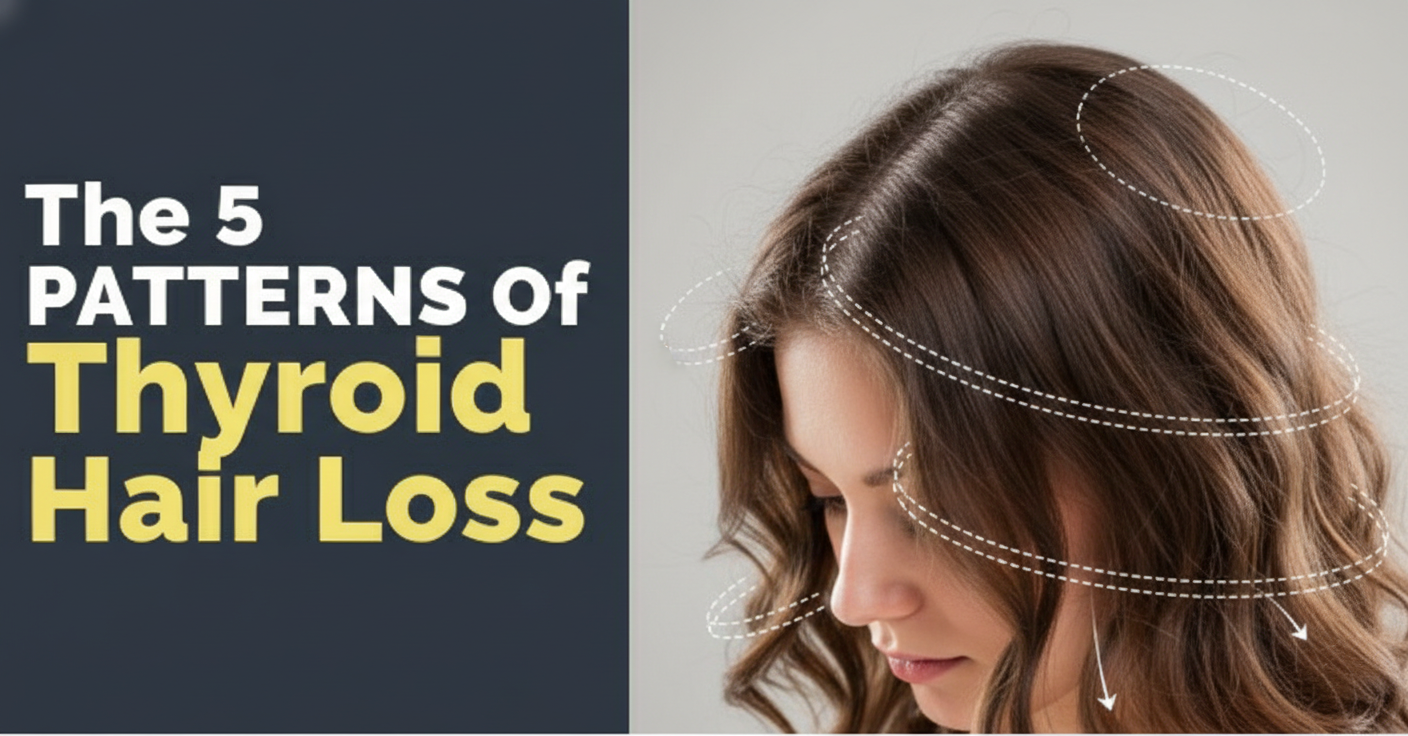
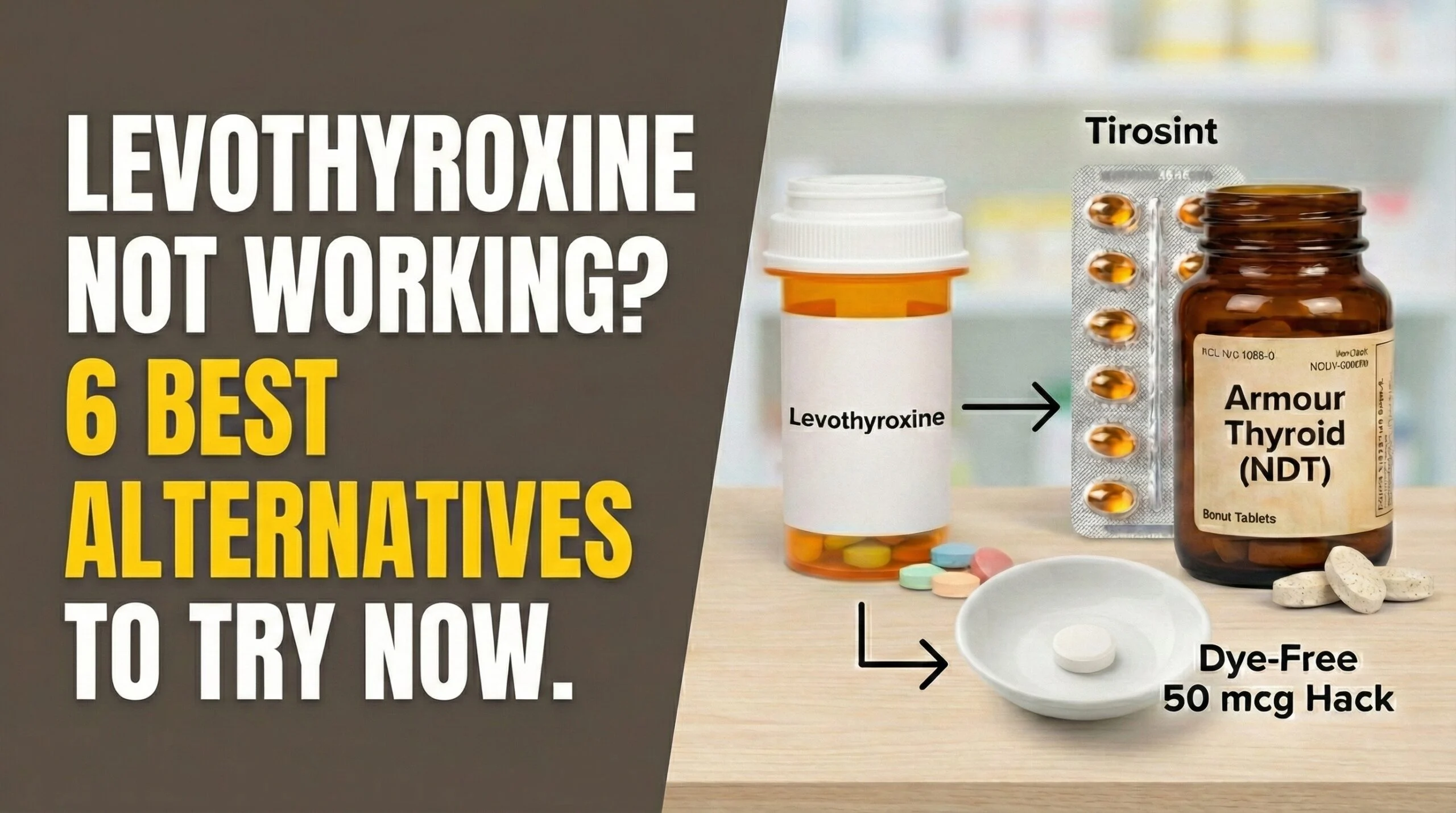
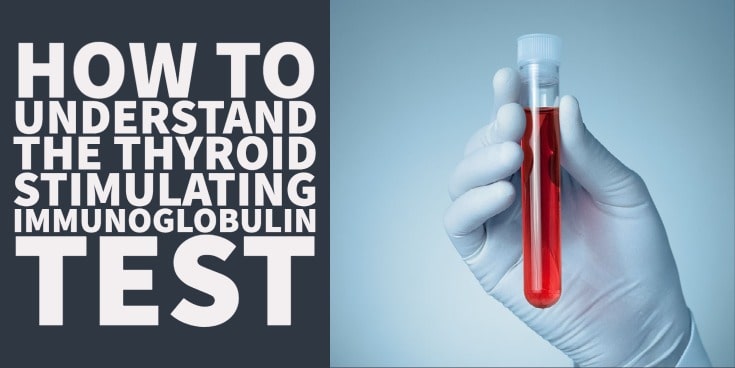
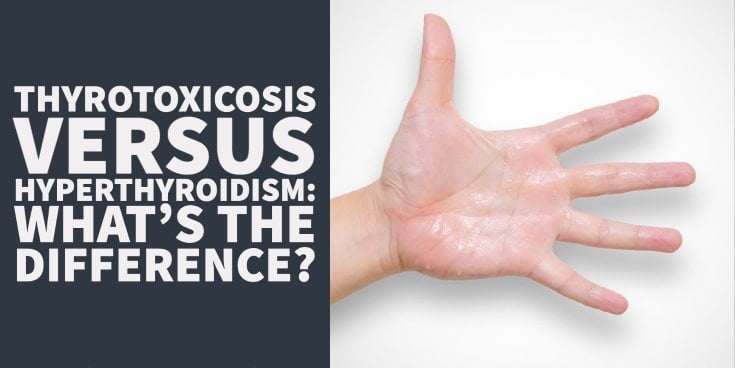
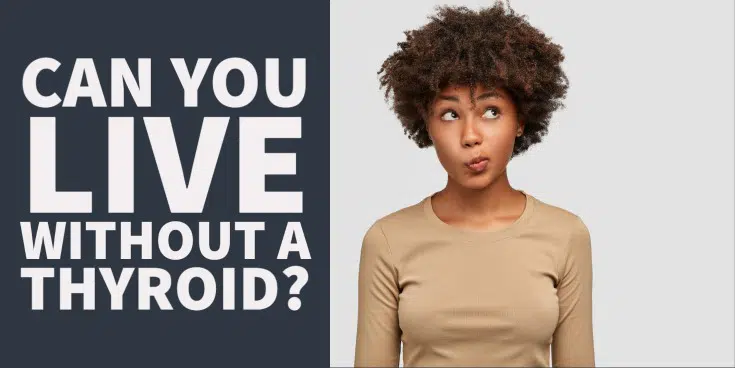
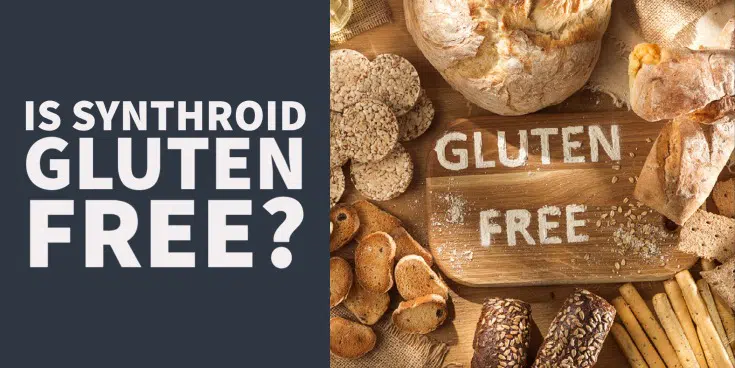

At the age of 41, 2009 I underwent a complete removal due to several nodules. I rapidly gained 50 pounds. My body aches all over, sensitive to cold temperatures, my hair falls out and breaks off. I have developed high blood pressure and ANA tests positive a few times.
Hi Margie,
Your weight gain is most likely due to under medication after your operation. When you don’t have a thyroid you must take oral thyroid medication to compensate, but what many people don’t realize is that the body naturally produces both T3 and T4 but most doctors only medicate with T4. This seems to be the issue for many patients and may be the cause of weight gain you are experiencing.
Hi, I have thyroid cyst at my age of 42, 2012.
My doctor using the fine needle aspiration for my first treatment.I have experienced three times by using this method from year 2012 until now.
But this time this method cannot work. This is because of the fluid is too sticky. Why this will happen? My doctor keep going advice me to do the surgery and take out my whole thyroid gland.
What will happen if I don’t have the thyroid gland? By taking the medication, can it completely replace the function of thyroid gland? The most important part that I concern is the weight gain.
Thank you.
Hi Lim,
You can learn more about what to expect after thyroid removal in this post: https://www.restartmed.com/can-you-live-without-a-thyroid/
The short answer is that yes you may experience weight gain but it’s more complicated than just a yes or no answer.
Hello. I’m 51 years old, female, and have been diagnosed with a 5cm cyst on my thyroid. I went through all the medical steps you described: examination, ultrasound, aspiration. It is non-cancerous. But it grew back 3 weeks after the aspiration. I’ve had thorough blood tests and my thyroid function is normal. I’m a singer and a voice teacher and it feels very uncomfortable. I feel pressure on my larynx and it causes me to constantly cough. (Not good for my professional career!) I did acupuncture on it and it shrunk for a week, but It is growing back. I’m continuing that treatment to try to keep it at bay. I also did three sessions of craniosacral therapy. But am not yet seeing permanent results. I changed my diet to mostly organic gluten-free, dairy-free and no processed sugar. I’ve read that taking out other foods like nightshades, legumes and certain fruits help. I would appreciate your opinion. It is very disheartening and uncomfortable. Especially since it is interfering with my career. Thank you for your consideration.
Hi Noel,
There are some other therapies that you might try such as sclerosing the cyst with agents such as ethanol. You could continue with the natural therapies to see if they have a positive benefit and then try the more invasive procedure if they do not.
I have a 5 cm cyst on my right thyroid gland. And got diagnosed with a hyperfunctioning thyroid. My doctor does not think that the cyst is cancerous, but it seems to have taken over about half of my thyroid. My doctor put me on thyroid blockers to regulate the over function, and recommend the removal of my Thyroid. I do not want to remove it, at least not as a first procedure, so I decided to try to drain it first and take the medication and see how that works.
Is there a way to heal a cyst? Does my diet matter? I eat pretty healthy and mostly organic.
My cyst is .45 x .61 and it was found by an ultrasound. Does it just need to be monitored?
I have a 3cm thyroid cyst and it has been drained twice but has filled again. This time it is not noticeable but my doctor recommended having my thyroid removed. It seems extremely invasive procedure if it is not cancerous. Any diet recommendations to drain the cyst?
Greetings and Grand new day…
I have just friday past had an ultrasound done on my thyroid. The test came back that I have multiple cyst and an enlarged lymph node. My thyroid us 6x larger than normal. I was diagnosed with the goiter in 2018 with no medical treatment until now.
My doctor has scheduled a biopsy and an autoimmune test.. because all my thyroid levels are “normal”… No hypo or hyperthyroidism. And added additional concern because my mother was diagnosed with lupas beginning of last year.
I hope to receive the appointment call soon.. Because the not knowing is causing great levels of anxiety & depression.
Hello….
I have done all above …. ultrasound, needle biopsy, drainage and the cyst returns.. Although my bloodwork shows normal thyroid function, I have substantial weight gain with no explanation and exhaustion with changes in mood… Can I still have effects with normal blood results?
Hi Wendy,
Yes, I would recommend you read this article on that exact topic which explains how it happens: https://www.restartmed.com/normal-thyroid-levels/
My 6 year old grandson is having a large cyst removed from his thyroid. The doctors told my son that the cyst may be causing levels to be abnormal and possibly contributing to his behavior issues.
Is this possible?
Hi Sue,
It’s always possible but I would say not likely.
Hi there,
My name is Julie Penn-Dunnett, im 40 years of age and have just been diagnosed with a colloid cyst on my thyroid. Its quite large apparently and ive been referred to ENT for surgery. My gp has been a bit of a nightmare and I had to press him to refer me to the Thyroid clinic which im still waiting on. I had my bloods done, they were TSH 0.94, T4 13.6 and T3 4.00, my ferritin was 23 which is an improvement as it used to be 4. I know from looking that these arent in the optimal range but the gp says they are normal. I have various symptoms, my hairs falling out, im tired all the time, I have carpal tunnel, Ive had multiple miscarriages, im putting weight on and cant lose it, my skin is dry, my periods have been weird for the last few years, Ive had ovarian cysts, an iodine skin test showed a deficiency as it disappeared in less than 10 hours and im grumpy and irritable all the time and have headaches all the time. Im losing patience and just dont know what to do now. Could you offer me any advice at all please as im at my wits end.
Many Thanks.
Hello,
I am a 54 yr old female and was just diagnosed with a complex cystic mass on my right lobe of my thyroid. My go referred me to an ENT and I have an appt next week. 2 weeks ago when I had the ultrasound I could feel what I described as a marble in my neck but now I can no longer feel it but I feel like there is something stuck in my throat. I have had a persistent cough for several months as well. Fatigue is another symptom. What should I expect from the ENT?? Thank you!
I discovered cyst on the right side of my thyroid in my late 30s, I’ve had them drained multiple times and they always fill back up. I have biopsies done yearly and they are clear from cancer cells. My question is, I’m estrogen dominant and have changed my diet to be a glutenfree vegan, because one of my doctors stated I had gluten ataxia, which is just constant dizziness to the point I’m no longer able to drive or work. I keep trying different holistic approaches to resolve my situation, but all to no avail. My current endocrinologist said to have my thyroid removed and start medication, but I dont want to be on meds for the rest of my lift. What am I missing?
After going through all of the tests mentioned earlier, I recieved a call from my PCP about the results of the tests. I was sent to see a ENT and he removed my left thyroid gland. My right thyroid gland has nodules on it with cysts also but the left gland had grown so big it blocked my airway and caused me to choke. If the right gland has cysts and nodules and is taking up the slack of the removed gland, Is it reasonable to expect the cysts on the right side to expand too?
Hi Misse,
Not necessarily. Cysts and nodules seem to operate independently of other thyroid gland tissue.
I’ve had a routine check ,(ultrasound) for thyroid – Dr. found a with a cyst, part solid, part fluid on left side of thyroid.
On the right side, only fluid and am scheduled for appointment.
If either/both of them are cancerous, can the cancer spread if I have a biopsy or fine needle aspiration?
Thank you for all your advice & time spent. It is greatly appreciated by all,
I’m sure. God bless.
Lynne
Hi Lynne,
Theoretically, yes, but that doesn’t appear to happen in practice, at least not to any significant degree.
hi my name is mr christopher roy have got an enhancend cyst on the right side of my neck have got to go to hospital to have it checked out
am worried it might be cancerous hope not
am 69 years old
what can they do about it
Hi Mr. Christopher,
No need to worry until you know what it is! I would sit tight until you get a biopsy or another more definitive test.
THE PAST 3 years i have had 3 ablations of the area on my {R} side thyroid cyst, as much as 300 cc’s has been extracted 3 times in 3 yrs because its gotten large enough to cause discomfort to me and my swallowing, all 3 were sent to the lab 1st pull was deep purple in color, 2nd looked like watered down grape juice last pull a month ago looked like tinted water slightly tan colored, 2 times ethanol 100% was injected and allowed to be in like 15 mins then drained, it always comes back, all 3 were sent to the lab none came back positive all were 100% negative, i dont want to have surgery because i dont do well on general Anastasia, would i have to worry about this becomming cancer? is there any other treatment i can have done? My Dr is Dr Rocke @ duke med center in NC who has been a gem along with his staff. Your thoughts please?
Ders dr Childs
In august 23 I had a cyst with fluid removed from the left side of my throat as it affected my breathing / pressed on my windpipe. They removed the cyst + some lymphs and said I needed to have my thyroid take out when I woke up from the OP. They said the liquid contained cancercells which came from my thyroid so it needed to be taken out. The week after I had my 2’nd OP where they took out my thyroid. I chose to say yes to their advise as I wanted to trust the doctors this time ( Im normally very holistic ) I now wish I hadnt though as it have had a big impact on my body and dailyday life. I have later found out a lot of people choose to live with cancer in their thyroid instead of having it removed as its a better soloution and that ckind of cancer normally are a slow growing type of cancer.
Im not feeling well on the medicine theyve prescribed me, skinrashes on my forehead, aches and pain in my joints, headaches, slow thought processes and low memoryspand + extreme lack of energy, just wanna slep constantly.
I get 150 mcg Eltroxin / Levothyroxine sodium +
I have just added iron, selenium, c-vitamin, D-citamin, B12 and zinc
Ive asked for Armour because a lot of people reccommend it , but the danish doctors wont prescribe it, theyre obsessed with using all the synth Levothyroxine meds and have removed the Tf3 test as a possibility from the blodtests, as they say you cant count on it, while a lot of other people say its very important. Im just so confused as its a jungle to navigate in. Can you help or guide me pls. in what I should do, Im feeling really low
Is there any herb remedy I can eat instead of synth meds
Kinds wishes
Lone 🙂